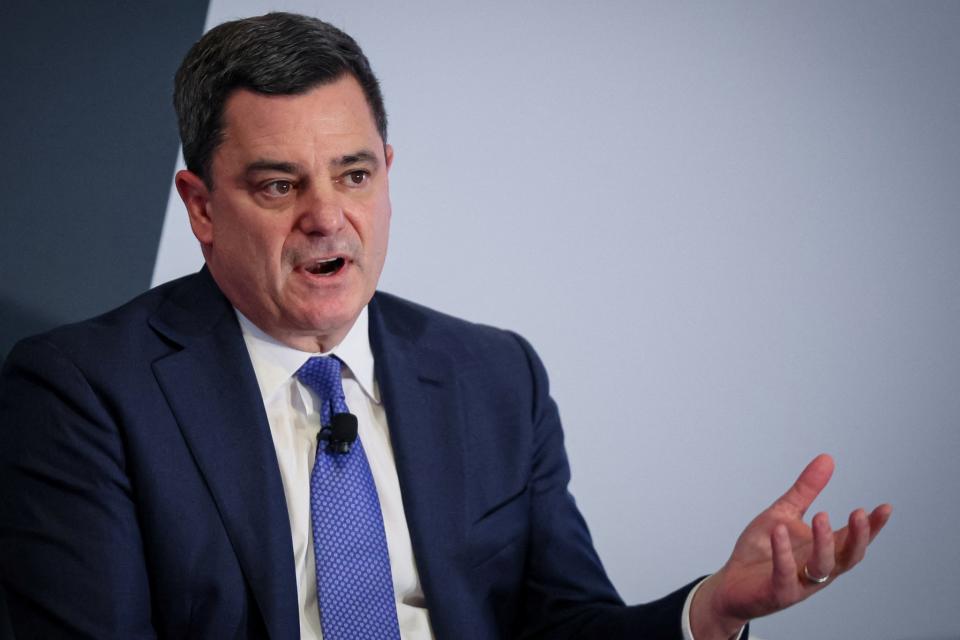Goldman’s Jim Esposito to retire after nearly 3 decades: ‘Sometimes you have to pause to acknowledge the chapters you’ve written’

Calls for Goldman Sachs CEO David Solomon to leave may have died down, but that’s not stopping executives from departing the storied investment bank.
The latest is Jim Esposito, co-head of banking and markets, who's set to leave the firm after nearly 30 years. Esposito joined in 1995 as a salesperson for emerging markets debt. In 2002, he was named a managing director and in 2006 was made partner, according to his official bio.
In a Monday post on LinkedIn, Esposito wrote that he’d been consumed with a feeling of “merely going through the motions,” which isn’t in his DNA or what made Goldman so special. “No formal plans for what comes next, which feels like the ultimate luxury after going full out for decades. Standing at a crossroads, sometimes you have to pause to acknowledge the chapters you’ve written."
Esposito played an important role in bringing together Goldman’s global markets and investment banking franchises to form its global banking and markets business, Solomon wrote in a memo to employees seen by Fortune. “No matter the role, Jim has dedicated himself to our business with a keen focus on serving our clients, promoting effective risk management and enhancing the culture of the firm,” Solomon wrote.
Partners leaving Goldman isn’t new. Executives typically move on when they are asked to, retire, or find something new. For example, Chris Kojima has joined the private equity firm General Atlantic as global head of capital solutions, according to a statement on Monday. GA is looking to be the latest PE firm to list its shares and has confidentially filed to go public, Bloomberg reported in December. Kojima spent nearly 29 years at Goldman, where most recently he was a partner and global co-head of the client solutions group. Julian Salisbury, who was named CIO of Goldman’s asset and wealth management division in a 2022 reorganization, officially started at Sixth Street this month. His departure from Goldman was announced in July.
Esposito, after leaving his current position, will become a senior director, the memo said. His retirement is expected in the next few months, a person familiar with the situation said.
One former Goldman executive told Fortune he wasn’t surprised that Esposito decided to walk away after realizing Solomon wouldn't be leaving anytime soon. Esposito aspired to be president or CEO of Goldman, the Wall Street Journal reported Monday.
Solomon came under intense criticism last year for his prickly leadership style, for Goldman’s push into consumer banking that resulted in the sale of GreenSky, and for his side gig as a DJ. (Solomon is no longer pursuing this hobby.) Some partners complained about Goldman’s troubles, including former CEO Lloyd Blankfein, raising questions about the bank’s leadership, the New York Times reported in August.
That died down when Adebayo “Bayo” Ogunlesi, the founder, chairman, and CEO of Global Infrastructure Partners and the lead director of Goldman’s board, came to Solomon’s defense. Ogunlesi told Mike Mayo, a Wells Fargo equity analyst, in the fall of 2023 that Solomon had the backing of Goldman’s board. In a Sept. 18 research note, Mayo wrote, in part: “Our meeting with the board’s lead director leads us to conclude that the CEO will stay in his role for at least the medium term.” (Ogunlesi is expected to leave the GS board once BlackRock closes its $12.5 billion acquisition of GIP.)
Solomon should be safe for now, said the former Goldman exec who spoke to Fortune. It certainly doesn't hurt that Goldman's recent earnings report surpassed Wall Street estimates. The firm reported that fourth-quarter profit rose 51% to $2.01 billion compared with a year earlier, while diluted earnings per share jumped 65% to $5.48, according to a statement. Quarterly net revenue rose 7% to $11.3 billion.
Goldman Sachs shares since early January 2023 are up about 12%, compared with rival Morgan Stanley gaining just 2% over that same span.
This story was originally featured on Fortune.com
